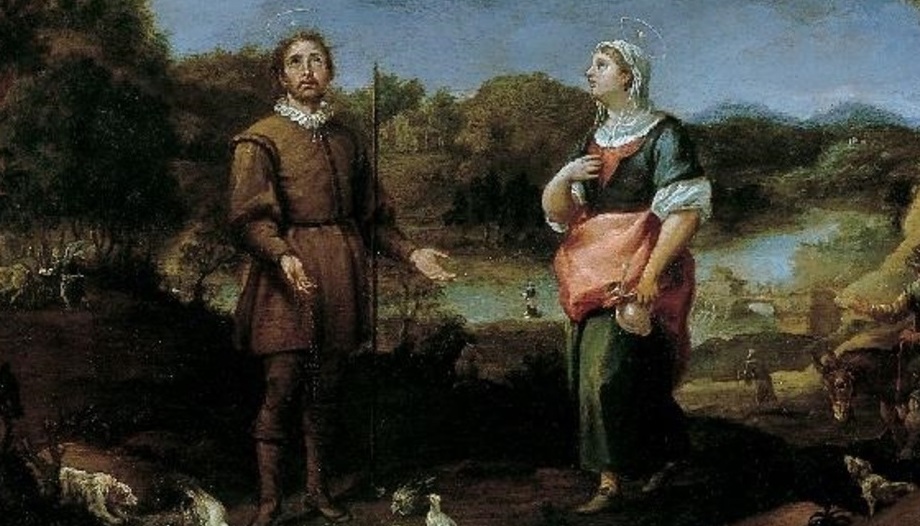The May 15On the feast of St. Isidro Labrador, patron saint of farmers, the Church puts in the spotlight a layman, married to another saint, Maria de la Cabeza, and father of a family. Holy marriages are few in the Christian calendar, but things are about to change.
I say few in proportion, given the numerical superiority among the baptized, with respect to the ordained or consecrated; but of course there are many holy marriages. From the model of the Holy Family, with Mary and Joseph; passing through Saints Priscilla and Aquila -collaborators of St. Paul-, St. Gregory the Elder and St. Nona -fathers of Saints Gregory the Theologian, Caesarius and Gorgona- or the numerous married couples martyred during the religious persecution in Japan or Korea; up to the most recent Blessed Louis Martin and Celia Maria Guerin -fathers of St. Therese of Lisieux- or Louis and Maria Beltrame Quattrocchi, among others.
And I say it will change because in a society that has been radically transformed in recent decades, the way to be good news in the world can no longer be the same as before.
The vocations of special consecration were considered for those who had a greater restlessness, for those who had made a more radical approach of dedication to God, while marriage was the state of life, let's say, by default of the ordinary Christian. Those who did not become a priest, a nun or a monk, got married and those who did not even get married, stayed -speaking disparagingly- to dress saints. This unjust gradualism of the Christian life, as if holiness were measured by states of life instead of by the stature that Christ attains in us, blurs the call of God that all of us: single, married, priests or religious have since our baptismal consecration.
Recently, while chatting with a religious friend, we were joking about how marriage could be, today, the Christian vocation for the most hardened (in reality all of them are impossible without the grace of God, of course). We reflected that there is nothing like marriage to live today the three evangelical counsels (chastity, poverty and obedience) professed by religious.
As for chastity, the hypersexualization of society and the new customs and habits make it increasingly strange and countercultural to live this grace in its various facets: whether in courtship, during the fertile stage of marriage when openness to life becomes a battle or during maturity, when idleness can lead to infidelity; and as long as there are no health problems involved! Conjugal chastity is also a singular gift of grace and even a manifestation of the future century, for the spouse is but a reflection of Christ as the only spouse.
If we are talking about poverty, I can think of no better way to live it today than forming a Christian family. How many sacrifices parents make for their children! That trip of their dreams, that hobby they are passionate about or that whim they saw in a shop window are always postponed in order to pay the mortgage, to buy tons of diapers, to buy the grandfather's medicines, to pay the tuition of the university student who could not get a scholarship or the umpteenth glasses of the most unruly one. And the parish fee, of course! Where better to live sharing, fraternity, than in a family? Marriage could very well be one of those "new forms" of expressing the voluntary poverty embraced by the following of Christ that the Council proposed to cultivate.
Obedience is the most serious part, because in a world as individualistic as ours and in which the relationships between men and women are only approached from the perspective of conflict, talking about submitting to another makes you almost suspicious. But in Christian marriage, the spouses (literally, those who are subjected under the same yoke), know that their freedom lies in molding themselves to the will of the other. Those who have become one flesh obey each other as Jesus obeys his Father, to whom he said: "You and I are one".
I am not trying with this reflection to detract from the value of consecrated life, but quite the contrary: to show that there cannot be first and second class states, as it seems by reading the list of saints recognized by the Church, but that, as it is pointed out in the list of saints recognized by the Church, there can be no first and second class states. Lumen GentiumIn this way, "all the faithful, Christians of every condition and state, strengthened by so many and such powerful means of salvation, are called by the Lord, each in his own way, to the perfection of that holiness with which the Father himself is perfect".
The current crisis of consecrated life is the same as that of married life. The more we equate them and the more we invite the faithful to live evangelical radicality, the easier it will be for young people to see the call to vocations of special consecration because they are but another charism within the same call to holiness.
Today we commend to St. Isidore and to St. Mary of the Head all single men and women, priests and religious; but let us also pray to them so that there may be more holy marriages that give witness that, by loving one another as Christ loved his Church, one can become a sign of perfect charity.
Journalist. Graduate in Communication Sciences and Bachelor in Religious Sciences. He works in the Diocesan Delegation of Media in Malaga. His numerous "threads" on Twitter about faith and daily life have a great popularity.








